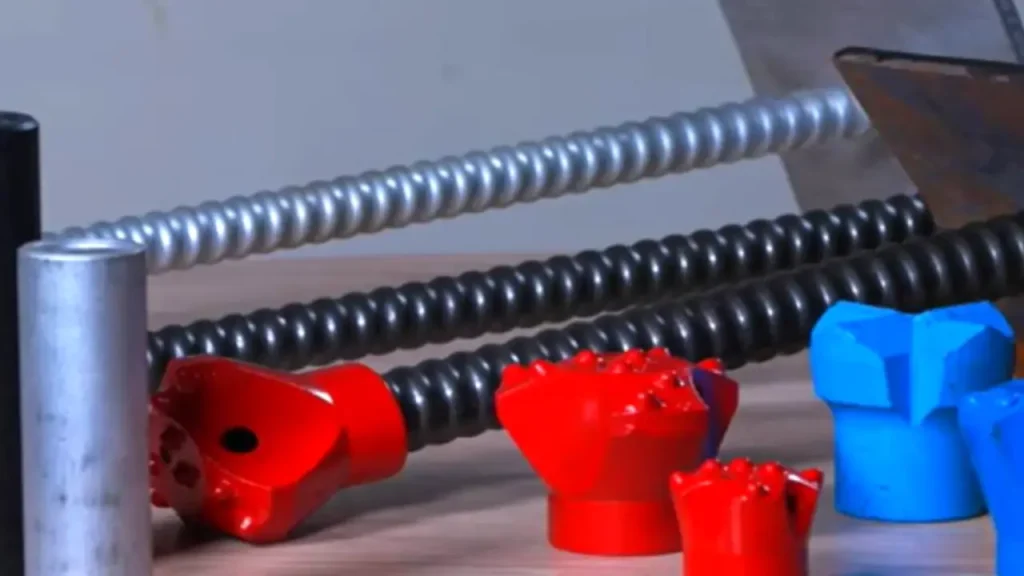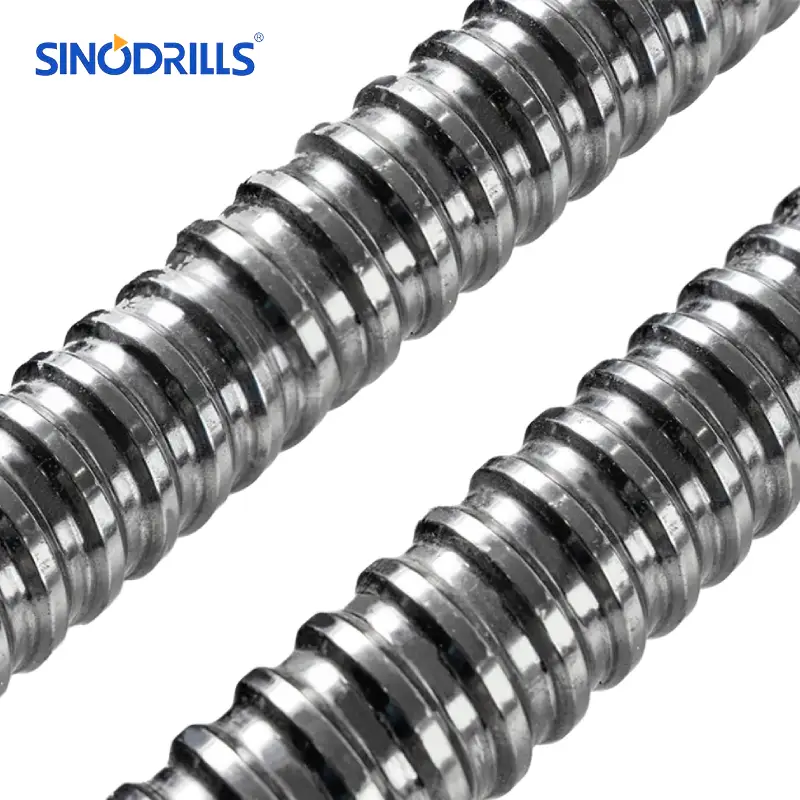The self-drilling anchor bolt is a modern solution that has revolutionized geotechnical and mining projects. Unlike traditional bolts, this innovative system combines drilling, grouting, and anchoring into a single, seamless operation. This not only significantly reduces installation time but also enhances efficiency and safety in complex ground conditions.
This guide will take you through the intricate process behind the manufacturing of these specialized bolts. We will explore the journey from raw materials to the finished product, covering the sophisticated engineering and quality control that ensure each bolt meets the high standards required for critical applications.
What are Self Drilling Anchor Bolts?
Self-drilling anchor bolts, also known as hollow bar anchors, are a modern and efficient type of fastener designed for ground stabilization in challenging geological conditions like sand, gravel, silt, and fractured rock. Unlike conventional anchors that require a pre-drilled borehole, these bolts integrate a hollow steel bar with a sacrificial drill bit at the tip.
This unique design allows the bolt to drill its own hole, while a cementitious grout is simultaneously injected through the hollow center. This process prevents the borehole from collapsing, consolidates the surrounding ground, and creates a secure and reliable bond, making them a preferred solution for applications in mining, tunneling, and civil engineering.
How to Manufacture Self-Drilling Anchor Bolts?

The manufacturing of self-drilling anchor bolts is a meticulous process that combines advanced technology with precision engineering. These specialized bolts, crucial for modern geotechnical and mining projects, undergo several sophisticated stages to ensure they are both strong and durable enough for the most demanding applications.
Step 1: Material Selection and Preparation
The process begins with the careful selection of high-grade steel bars, typically of a specific grade, to meet the required strength and durability standards. These raw materials are chosen for their mechanical properties, such as tensile strength and yield strength, which are essential for the bolt’s performance under load. After selection, the bars are cut to the precise length needed for the final product, a crucial step that minimizes waste and ensures dimensional accuracy.
Once cut, the steel bars are prepared for the next stage. This preparation often involves heating the bars to a specific temperature, making them more malleable for the subsequent hot-rolling process. This thermal treatment is a critical part of the process, as it helps to refine the internal grain structure of the steel, ultimately improving its mechanical properties and preparing it for the intricate shaping of the threads.
Step 2: Hot Rolling and Thread Formation
In this stage, the heated steel bars are fed into a specialized rolling machine that features a series of shaped rollers. As the bars pass through these rollers, the continuous external threads are progressively formed onto the surface. This hot-rolling process is highly efficient and creates a uniform, consistent thread profile along the entire length of the bar. It is essential for producing the characteristic “rope” or “T” thread patterns found on self-drilling anchor bolts.
The hot-rolling process is more than just a shaping technique; it’s a form of metalworking that enhances the bolt’s strength. By compacting the steel and altering its grain structure, the rolling process increases the material’s tensile and shear strength. This results in a thread that is not only robust but also perfectly suited to create a strong mechanical bond with the injected grout and the surrounding ground.
Step 3: Forging the Drill Bit and Coupler Ends
After the threads are rolled, the ends of the hollow bar are shaped to accommodate the drill bit and the coupler. One end is forged to create a hollowed-out section where the sacrificial drill bit will be attached. This end is designed to be strong enough to withstand the rotary-percussive forces of drilling, while also allowing for the flow of grout through the hollow core. The precise shaping of this end is critical for ensuring a secure fit for the drill bit.
The opposite end of the bar is forged to be compatible with a coupler. This allows multiple bolts to be connected together for deep drilling applications, a key feature of the self-drilling system. The forging process for both ends is a high-precision operation that ensures each bolt can function seamlessly as part of a larger system, providing a secure and extendable anchorage solution.
Step 4: Drilling the Grout and Flushing Holes
With the main structure of the bolt formed, the next step involves drilling small holes into the sacrificial drill bit. These holes, often referred to as grout ports or flushing holes, are crucial for the injection of grout during installation. They are strategically placed to ensure that the grout is evenly distributed into the borehole and the surrounding voids, creating a solid and stable bond between the bolt and the ground.
These holes also serve a secondary function: flushing the debris from the borehole during the drilling process. As the bolt is rotated and advanced, water or air is pumped through the hollow core and exits through these holes, cleaning out the cuttings and ensuring a clear path for the bolt. The precise size and placement of these holes are carefully engineered to optimize both the drilling and grouting operations.
Step 5: Heat Treatment
Heat treatment is a fundamental step in the manufacturing process that significantly improves the mechanical properties of the bolts. This involves heating the bolts to a high temperature, then cooling them in a controlled manner, a process known as quenching. This alters the crystal structure of the steel, increasing its hardness and wear resistance, which is essential for a product that will be subjected to high levels of stress.
Following quenching, the bolts are tempered. This involves reheating them to a lower temperature to reduce brittleness and increase their toughness. The specific temperature and duration of the heat treatment are carefully controlled to achieve the ideal balance of hardness and toughness, ensuring that the finished product can withstand the demanding conditions of geotechnical and mining applications without breaking.
Step 6: Surface Finishing
The final step in the manufacturing process is surface finishing, which is essential for protecting the bolts from corrosion. The most common finishing process is galvanization, where the bolts are coated with a layer of zinc. This provides a durable, rust-resistant barrier that extends the service life of the bolt, particularly in wet or chemically aggressive environments.
Other coatings may also be applied depending on the specific application requirements. This process is crucial for ensuring the longevity and integrity of the anchor bolt, as it will be buried in the ground and exposed to various elements over its service life, protecting its structural properties.
Step 7: Quality Control
Before packaging and shipping, every batch of self-drilling anchor bolts undergoes a rigorous quality control inspection. This includes checks for dimensional accuracy, thread integrity, and mechanical properties. Load-bearing tests are often conducted to ensure the bolts can handle the specified loads, guaranteeing that they will perform reliably in the field.
This final step is crucial for ensuring product safety and a long service life. By meticulously checking each bolt, manufacturers can guarantee that their products meet all necessary safety standards and will perform as expected in the demanding environments they are designed for, from soil nailing to tunnel support.
Why Choose Sinodrills Self Drilling Anchor Bolts?
When choosing Sinodrills self-drilling anchor bolts, customers benefit from a combination of advanced manufacturing, high-quality materials, and a focus on efficiency. The company’s products are designed to simplify and accelerate construction processes.
- Integrated Efficiency: Sinodrills’ bolts combine drilling, grouting, and anchoring into a single process, which significantly reduces installation time and labor costs on site. This streamlines projects in complex geological conditions.
- Robust Construction: The bolts are manufactured from high-grade steel using a hot-rolling process that enhances their tensile and shear strength. This ensures the continuous threads are robust enough for rotary-percussive drilling and create a strong bond with the grout.
- Versatility: The self-drilling anchor systems are highly adaptable and suitable for a wide range of applications, including slope stabilization, tunnel support, and foundation reinforcement. Different thread types and drill bits are available to match various ground conditions.
- Quality and Reliability: With over 20 years of experience and a robust quality control process, Sinodrills produces anchor bolts that are engineered to meet and exceed international standards. This commitment to quality ensures reliable performance in demanding environments.
- Global Reach: As a leading exporter, Sinodrills has a proven track record of supplying high-quality rock drilling tools to over 110 countries and regions, demonstrating its reliability and expertise on a global scale.
Conclusion
In conclusion, the manufacturing of self-drilling anchor bolts is a meticulous process that combines advanced technology with precision engineering. Each stage, from hot rolling the steel bar to the final surface treatment, is carefully controlled to produce a bolt that is not only strong and durable but also perfectly suited for challenging environments. The integration of the drill bit and the hollow core design is a testament to the innovation that drives modern construction and mining.
These bolts are essential for applications where conventional anchoring methods are impractical, providing a reliable and efficient solution for ground support in tunnels, slopes, and foundations. The unique ability to simultaneously drill and grout ensures a stable and secure installation, reducing risks and improving project timelines.
For all your geotechnical and construction needs, you can get wholesale self-drilling anchor bolts from Sinodrills. Our products are manufactured to the highest standards, offering superior performance and reliability for your most demanding projects.



